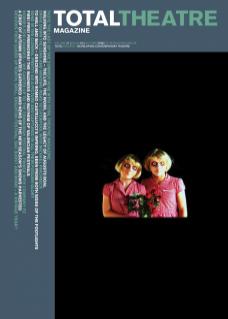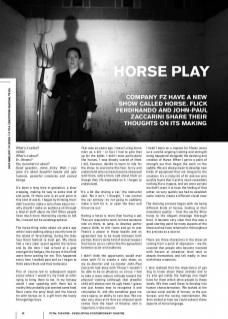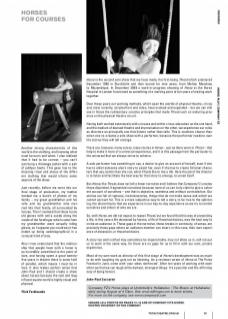What’s it called?
HORSE
What’s it about?
Er...Horses?
Yes, but what’s it about?
Good question....mmm...tricky. Well, I suppose it’s about beautiful beasts and ugly humans, powerful creatures and scared beings.
It’s been a long time in gestation, a slow creeping, making its way to some kind of end point, (if there ever is an end point in this kind of work). I began by thinking that I didn’t want to make a solo show about me – why should I make an audience sit through a load of stuff about my life? Other people have much more interesting stories to tell. No, it would not be autobiographical.
The horse thing came about six years ago when I was walking along a country lane on the island of Terschelling, during the fabulous Oerol festival (a must go). My shoes had a very clear sound against the tarmac and by the time I had arrived at a gate amongst the hedges, the horses in that field were there waiting for me. This happened every time I walked past and so I began to think about them and their behaviour.
This of course led to subsequent experiences where I would try my hand at whinnying to bring them to me. In my fantasy world I was speaking with them but in reality they probably just wanted some food. Next came the pony book and the biscuit tin with horses on it, a gift from the lovely Strangelings boys.
That was six years ago. I wasn’t a big horse rider as a kid – in fact I had to give that up for the ballet. I didn’t even particularly like horses, I was bloody scared of them. I did, however, decide to learn to ride for the show, to overcome this fear; to try and understand why so many become obsessed with them, adore them, talk about them as though their life depended on it. I began to understand.
‘It’s a bit like driving a car,’ the instructor said. ‘No it isn’t,’ I thought, ‘I can control the car entirely; its not going to suddenly make a bolt for it, or open the door and throw me out.’
Having a horse is more than having a pet. They are required to work, to have someone ride on them, to jump, to develop performance skills, to win races and go to war. There’s a power in those beasts and an agreement has to be made between both parties; there’s some kind of mutual respect that has to occur, rather like the agreement between actor and audience.
I didn’t think the opportunity would ever arise with FZ to create a solo show, as my co-director and co-creator John-Paul Zaccarini had done with Throat; I wouldn’t be able to be so physical, so circus. I had to take a more mature attitude toward the physical training (although that dreadful child will always rear its ugly head, I guess one just knows how to recognise it and rationalise it), and this somehow gave me more space, an ability to care less. We are also very clear at FZ that our physical work comes from the heart of theatre; skill is important, tricks are not.
I hadn’t been on a trapeze for fifteen years so a careful ongoing training and strengthening happened alongside the devising and creation of Horse. When I got to a point of strength we then began the work on the saddle. We are always keen to develop new kinds of equipment that are integral to the creation; it’s a tricky bit of kit and we very quickly found that it pretty much resembles nothing like a trapeze, and we were certain we didn’t want it to have the feeling of that either, so very quickly we had to establish some rules to create a different visual view.
The devising process began with me being different kinds of horses, looking at their movement quality – from the earthy Shire horse to the elegant dressage thoroughbred. It became very clear that this was a good starting point for many aspects of the show and we have returned to it throughout the process as a source.
There are three characters in the show all coming from a point of obsession – we discovered that people who become involved with horses at whatever level tend to absorb themselves and fall madly in love with these creatures.
I also realised that the importance of getting to know about these animals and to try and get inside the feelings one might have for them which drive people to these levels. We then used these to develop into human characterisation. We looked at the various vocal worlds of horses; at the auctioneer, and the racing commentator. We then looked at how we could subvert these aspects of horse language.
Another strong characteristic of this world is the clothing, and knowing what must be worn and when. I also realised that it had to be correct – you can’t just bung a dressage jacket with a pair of jodhpur boots. This gave rise to the dressing ritual and status of the different clothing that would inform some aspects of the show.
Just recently, before we went into our final stage of production, my mother handed me a bunch of photos of my family – my great grandfather and his wife and my grandmother who married into their family, all surrounded by horses. Then I realised that those funny old gloves with extra suede along the inside of the forefinger which came from my grandmother were actually riding gloves, so I suppose you could say it has ended up being autobiographical in a carousel kind of way.
Also I now understand that the relationship that people have with a horse is so incredibly committed to the point of love, and having spent a good twenty-five years in theatre there is some kind of parallel, which means I must be in love. It also makes perfect sense that John-Paul and I should create a show about horses because the vast and magnificent equine world is highly visual and physical.
Flick Ferdinando
Horse is the second solo show that we have made, the first being Throat which premiered December 1998 in Stockholm and then toured for nine years, from Melton Mowbray to Mozambique. In December 2008 a work-in-progress showing of Horse at the Horse Hospital in London functioned as something of a marking point of ten years of making work together.
Over those years our working methods, which span the worlds of physical theatre, circus and, most recently, scripted text and video, have evolved and expanded – but we can still see in Horse the rudimentary creative principles that made Throat such an enduring presence on the physical theatre circuit.
Having both worked extensively with circuses and within circus education on the one hand, and the medium of devised theatre and improvisation on the other, we experience our roles as directors as principally one that listens rather than tells. This is nowhere clearer than when one co-creates a solo show with a performer, because that performer needs to own the stories they will tell onstage.
There are, however, many voices, many stories in Horse – just as there were in Throat – that help to make it more of a universal experience, and it is this passage from the particular to the universal that we always strive to achieve.
A solo performer has something to say, a desire to give an account of herself, even if she has to enlist someone else’s story to assist her, even if she has to create fictional characters that say, better than she can, what if feels like to live a life. Here the job of the director is to listen and facilitate the best way for that story to emerge, to unveil itself.
But Horse, like Throat, does not tell a linear narrative and I believe that Company FZ creates these disjointed, fragmented narratives because none of us can truly claim to give a coherent account of ourselves – one that is objective, seamless and without contradiction. Our stories are full of ruptures, inconsistencies, things that do not make sense and which we cannot account for. This is a more subjective way to tell a story, to be true to the splintering, the discontinuity that we experience in our day-to-day experience as we try to remind ourselves and others of who we are.
So, with Horse, we did not expect to repeat Throat, but we found that this way of presenting a life, in this case a life obsessed by horses, a life of thwarted desires, was the best way to invite an audience in. These gaps in the narrative, these breaks in continuity, of sense, are precisely those gaps where an audience member can insert, in this case, their own experience of obsession, or thwarted desire.
A story too well crafted may sometimes be impenetrable, may not allow us in, will not put us to work in the same way, for there are no gaps for us to fill in with our own, private experience.
Most of my own work as director of this first stage of Horse’s development was as much to do with laughing my guts out as listening. As a reviewer wrote of Horse at The Pulse Festival in June, come with ‘your sides reinforced’. After ten years of working with each other we find we can laugh at the darkest, strangest things. It’s a peculiar and life-affirming way of being honest.
John-Paul Zaccarini
Company FZ’s Horse plays at Underbelly’s Hullabaloo - The Bosco at Hullabaloo daily during August at 4.10pm. See www.edfringe.com to book tickets. For more on the company, see www.companyfz.com


